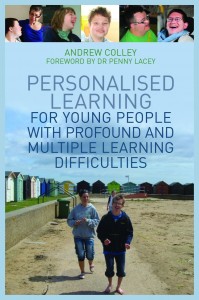Andrew Colley, author of forthcoming, Personalised Learning for Young People with Profound and Multiple Learning Difficulties, discusses his role as a teacher of teenagers with complex needs and explains what motivated him to write the book. 
I decided to write my book ‘Personalised Learning for Young People with Profound and Multiple Learning Difficulties’ because I wanted to answer a question. It was a question I had been asked quite often, usually by people I knew. Quite intelligent and sensitive people. Friends and colleagues even.
They usually asked it after I had described to them some of the young people I taught. Young people aged between about 14 and 19. Most of them didn’t speak. Some didn’t move very much either. Some had life-limiting conditions. Some were autistic. Some had epilepsy so severe that they needed to be watched 24 hours a day. Some didn’t even recognise their own parents. Some behaved in extremely challenging ways: biting, hitting, spitting, self harming. None of them would ever have jobs or marriages, or maybe even close friends. All would be cared for the rest of their lives.
The question I was often asked was this: ‘What do you actually teach them?’
It wasn’t an easy question because teaching these young people wasn’t easy either. In fact, it was the most challenging, exciting, draining, fascinating and complex sort of teaching I had ever experienced.
The question ‘What do you actually teach them?’ throws up many more questions than answers: How do you actually teach them? How do you get to know each one well enough to be able to support their learning and development? How do you manage behaviour so extreme that it seems to get in the way of any form of learning? What is actually meant in a situation like this by words we take for granted? Words like ‘teaching’, ‘learning’ and ‘curriculum’. What is a lesson? What is a classroom? How do you arrange the classroom? How do you manage the staff team? What does the timetable look like? How can you actually tell if learning has taken place? And possibly most important of all: how do you prepare each of them for what we hope will be a long adult life?
So I decided to write a book to try to answer as many of these questions as I could. And because the young people I had been working with were so fascinating, complex and individual, I decided to make them the stars of the show, the core of the book. Their lives, their behaviour, their personalities. The things they do and how they do them. It was a challenge to write, but then so it should be. It’s a challenging job.
The answer to the original question though, turned out to be relatively straightforward after all. ‘What do you actually teach them?’ It was an answer I had heard many times from the mouths of the parents and carers of these young people. It was an answer to a different question though. A question I had asked many times myself.
‘What do you want for your son or daughter?’
I noticed that the answer was always more or less the same. They wanted their son or daughter to be happy, to communicate as well as he or she can, and to be as independent as possible. ‘The Three Big Things’, I call them. To be happy. To communicate a little better and to be as independent as possible.
That’s what I try to teach them. The book is about how to do that.
Andrew Colley is the author of Personalised Learning for Young People with Profound and Multiple Learning Difficulties published by Jessica Kingsley Publishers.